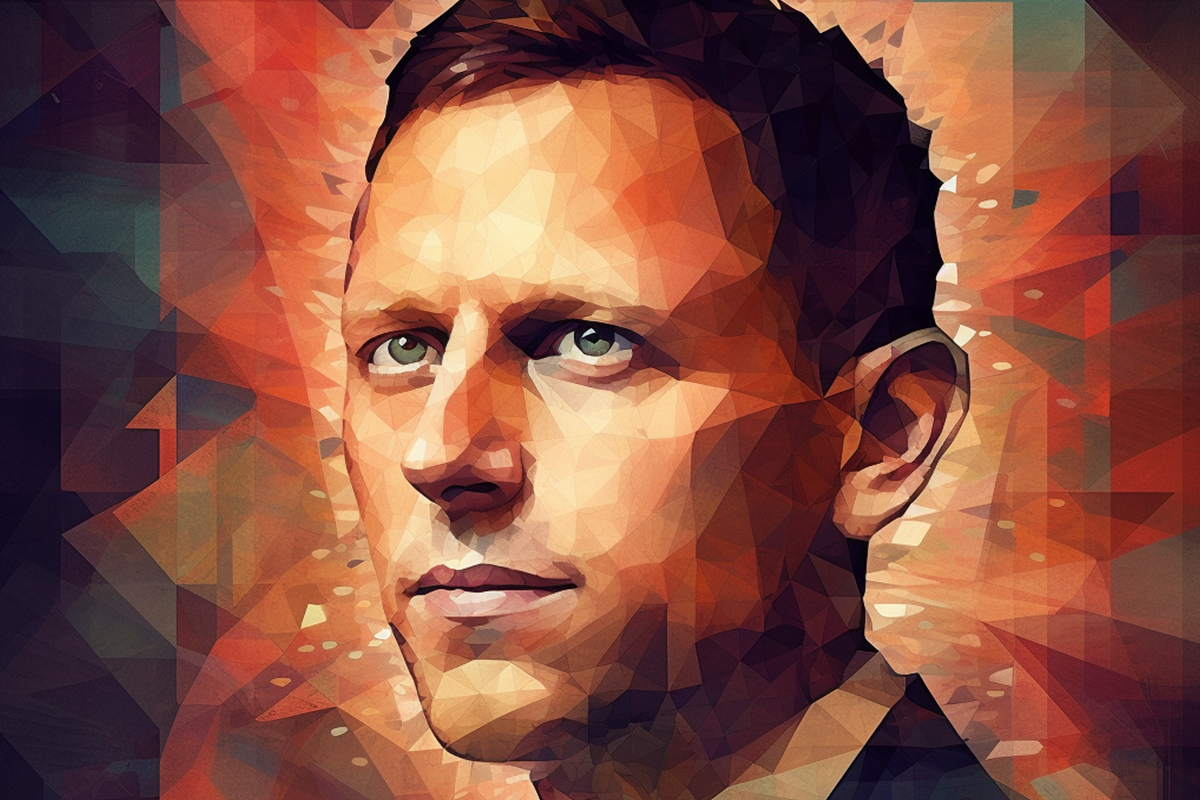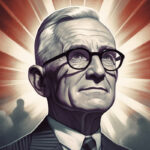Peter Thiel is a renowned entrepreneur, investor, and author who has had an indelible impact on technology and business. His insightful views on innovation and risk-taking have inspired countless entrepreneurs and investors around the world. In this article, we will delve into some of his most important literary works, key concepts, and real-world applications. We will also explore Thiel’s vision for a better future and the strategies he recommends for building it.

Introduction to Peter Thiel’s Literary Works
Peter Thiel has authored or co-authored several literary works that cover a wide range of topics, from startups and innovation to politics and society. In this section, we will offer a brief introduction to Thiel’s major literary works and the ideas behind them.
Who is Peter Thiel?
Peter Thiel is a Silicon Valley entrepreneur and venture capitalist who co-founded PayPal and Palantir Technologies, among other successful companies. Thiel is also a philanthropist, with a particular interest in advancing scientific research and education. His writing has been featured in several major publications, including The New York Times and The Wall Street Journal.
Thiel’s Impact on Technology and Business
Thiel’s impact on technology and business cannot be overstated. He has been credited with pioneering the use of online payments and revolutionizing the way people do business online. Thiel’s insights into the importance of innovation and risk-taking have also made him an influential figure in the world of entrepreneurship and venture capital.
One of Thiel’s most famous works is his book “Zero to One: Notes on Startups, or How to Build the Future“. In this book, Thiel argues that the most valuable companies are those that create something new and unique, rather than simply copying what already exists. Thiel encourages entrepreneurs to focus on creating “zero to one” innovations, rather than “one to n” imitations.
Thiel’s book “The Diversity Myth: Multiculturalism and Political Intolerance on Campus” is another notable work. In this book, Thiel argues that the push for diversity and multiculturalism on college campuses has led to a culture of political correctness and intolerance towards conservative viewpoints. Thiel suggests that universities should focus on intellectual diversity, rather than superficial demographic diversity.
Thiel has also written about his political views in his essay “The Education of a Libertarian”. In this essay, Thiel discusses his belief in small government and individual freedom. Thiel argues that the government should have a limited role in people’s lives, and that individuals should be free to pursue their own interests without interference from the state.
Overall, Peter Thiel’s literary works offer a unique perspective on a variety of topics, from technology and business to politics and society. Thiel’s ideas have had a significant impact on the world of entrepreneurship and venture capital, and his works continue to be influential today.
Zero to One: Notes on Startups, or How to Build the Future
Zero to One is Peter Thiel’s seminal work on startups, outlining his views on what it takes to build a successful business from scratch. Thiel, a co-founder of PayPal and an early investor in Facebook, draws on his own experiences as an entrepreneur to offer a unique perspective on the world of startups.
In this section, we will explore some of the key concepts from Zero to One and their real-world applications.
Key Concepts from Zero to One
One of the most important ideas from Zero to One is the concept of building “monopoly” businesses. Thiel argues that creating a unique product or service that nobody else can offer is the key to building a sustainable and profitable business. By creating a monopoly, a company can charge premium prices and capture a larger share of the market.
Thiel also emphasizes the importance of creating a “mission statement” that captures the essence of a company’s purpose and goals. A clear mission statement can help guide a company’s decisions and actions, and can also inspire employees and customers alike.
Real-world Applications and Success Stories
Several successful companies have applied Thiel’s teachings from Zero to One, including Airbnb, Tesla, and Facebook. These companies have created unique products and services that have disrupted entire industries, and have become some of the most successful startups in history.
Airbnb, for example, has revolutionized the travel industry by allowing people to rent out their homes to travelers. By creating a platform that connects hosts and guests, Airbnb has created a new market that did not exist before. Similarly, Tesla has disrupted the automotive industry by creating electric cars that are both stylish and environmentally friendly. And Facebook has transformed the way we connect with each other online, becoming the world’s largest social network in the process.
Overall, Zero to One offers a compelling vision of what it takes to build a successful startup. By focusing on creating unique products and services that solve important problems, entrepreneurs can build businesses that not only generate profits, but also have a positive impact on the world.
The Diversity Myth: Multiculturalism and Political Intolerance on Campus
The Diversity Myth, written by Peter Thiel, is a thought-provoking critique of multiculturalism and political correctness on college campuses. Thiel’s views on this controversial topic are both insightful and controversial, and they have sparked a great deal of debate in academic circles.
The Origins of The Diversity Myth
According to Thiel, the Diversity Myth emerged out of a cultural shift that occurred in the 1960s and 70s. During this time, academic institutions became more focused on social justice and identity politics, which led to the rise of multiculturalism and political correctness. Thiel contends that this shift has led to a culture of “political correctness” that stifles free speech and intellectual diversity on college campuses.
Thiel’s argument is that the Diversity Myth is a product of a larger cultural trend towards group identity politics. This trend has led to a situation where people are more likely to be judged based on their race, gender, or sexual orientation than on their individual abilities or accomplishments. Thiel believes that this is a dangerous trend that threatens to undermine the very foundations of our society.
Thiel’s Views on Multiculturalism and Political Intolerance
In The Diversity Myth, Thiel argues that multiculturalism and political correctness have led to a culture of intolerance and a lack of intellectual diversity on college campuses. He contends that this has led to a decline in the quality of higher education and a stifling of innovation and creativity.
Thiel’s argument is that multiculturalism and political correctness have created a situation where people are afraid to express their true opinions and beliefs. This has led to a culture of conformity, where people are more concerned with fitting in than with expressing their individuality. Thiel believes that this is a dangerous trend that threatens to undermine the very foundations of our society.
Thiel’s views on multiculturalism and political intolerance are controversial, but they are also thought-provoking. They challenge us to think critically about the role of diversity and free speech on college campuses and to consider how we can create a culture that values both individuality and community.
In conclusion, The Diversity Myth is a must-read for anyone interested in the future of higher education and the role of diversity and free speech in our society. Thiel’s insights are both provocative and insightful, and they offer a valuable perspective on one of the most important issues facing our society today.
The Blueprint: Reviving Innovation, Rediscovering Risk, and Rescuing the Free Market
The Blueprint, written by Peter Thiel, is a thought-provoking manifesto that offers strategies for reviving innovation and rediscovering risk-taking. Thiel’s vision for a better future centers around the idea of innovation and risk-taking. He argues that in order to build a better world, we need to take bold risks and invest in innovation and creativity.
Thiel believes that we are living in a time of technological stagnation, where we are not making significant strides in innovation. He argues that we need to reimagine our educational institutions to be more focused on promoting innovation and creativity, and less on conformity and rote learning. Thiel believes that by fostering an environment that encourages experimentation and risk-taking, we can create a better future.
Thiel’s Vision for a Better Future
Thiel’s vision for a better future is ambitious, but he believes it is achievable. He argues that we need to focus on creating new technologies that can solve real-world problems and improve people’s lives. Thiel believes that the key to unlocking innovation is to encourage people to take risks and experiment with new ideas.
Thiel also believes that we need to rethink our approach to education. He argues that our current educational system is not designed to foster innovation and creativity. Instead, it is focused on conformity and rote learning. Thiel believes that we need to create educational institutions that encourage experimentation and risk-taking.
Strategies for Reviving Innovation and Risk-taking
Thiel offers several strategies for reviving innovation and risk-taking. One of the key strategies is to invest in new technologies. Thiel argues that by investing in new technologies, we can create new industries and solve real-world problems.
Thiel also believes that we need to create a culture of experimentation and failure tolerance. He argues that failure is an essential part of the innovation process, and we need to embrace it. By creating a culture that encourages experimentation and tolerates failure, we can unlock new ideas and innovations.
Another strategy that Thiel advocates for is the importance of developing a coherent vision and mission statement. Thiel believes that having a clear vision and mission statement can guide a company or organization toward success. By having a clear direction, we can focus our efforts and resources toward achieving our goals.
In conclusion, The Blueprint offers a compelling vision for a better future. Thiel’s strategies for reviving innovation and rediscovering risk-taking are thought-provoking and offer a roadmap for creating a better world. By investing in new technologies, fostering a culture of experimentation and failure tolerance, and developing a clear vision and mission statement, we can unlock new ideas and innovations that can improve people’s lives.
Peter Thiel’s Recommended Reading List
Peter Thiel has a wide range of interests beyond entrepreneurship and technology and has recommended several books on philosophy and society that have influenced his worldview. In this section, we will explore some of Thiel’s recommended reading.
Books on Entrepreneurship and Innovation
Thiel recommends several books on entrepreneurship and innovation, including The Lean Startup by Eric Ries and The Innovator’s Dilemma by Clayton Christensen. These books offer insights into the latest trends and best practices in building successful startups.
Books on Philosophy and Society
Thiel’s recommended reading list includes several books on philosophy and society, including The Fountainhead by Ayn Rand and The Power of the Market by Friedrich Hayek. These books offer insights into the importance of individualism and free markets in promoting economic growth and prosperity.
Conclusion
Peter Thiel’s literary works offer invaluable insights into entrepreneurship, innovation, and the future of society. From Zero to One to The Blueprint, Thiel’s vision for a better future is inspiring and offers practical strategies for achieving success and growth. His recommended reading list is also worth exploring, offering a rich array of philosophical and societal perspectives on these critical issues. We hope this article has helped you discover the best books by Peter Thiel and inspired you to explore his work further.
FAQs
Who is Peter Thiel?
Peter Thiel is an entrepreneur and author. He was born in 1967 in Germany and now lives in America with his partner Matt Danzeisen. He is currently worth an estimated $4.6 billion.
What is Peter Thiel known for?
Peter Thiel is best known for co-founding PayPal, Founders Fund, OpenAI, and Palantir Technologies. He was also one of the first businessmen to invest in Facebook and significantly contributed to the establishment of artificial intelligence.
What has Peter Thiel written?
He has written several books, including Zero to One and The Diversity Myth.
- The 11 Best Books About Cats You Should Read - January 16, 2024
- The 9 Best Books on Building Confidence - January 16, 2024
- Discover the 10 Best Books on the Brain - January 16, 2024







